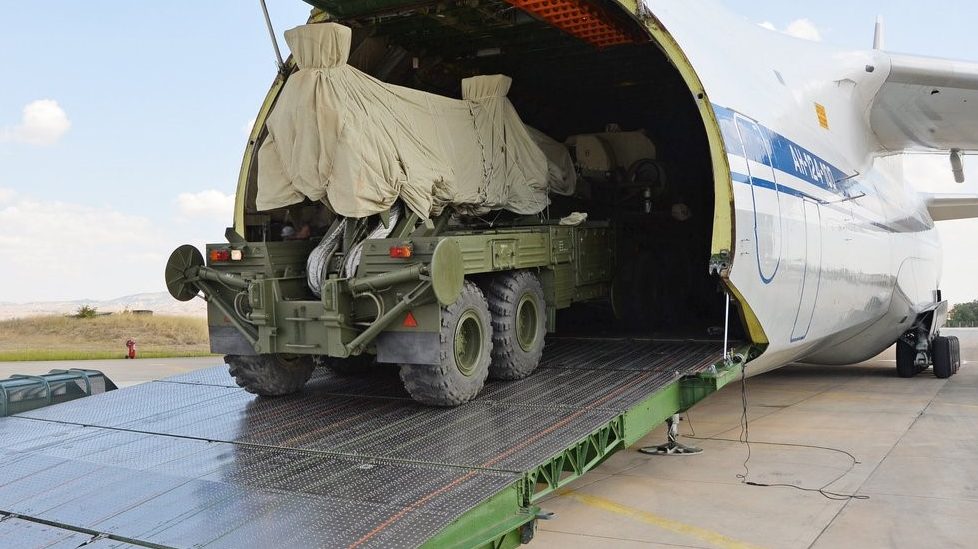Turkey Faces Growing Risk of US Sanctions over Russian Arms
Threats from Washington – which could increase under a Biden administration – come as Ankara struggles with falling currency
The chances that the US will impose sanctions on Turkey over its purchase of Russian arms is rising and could increase further still if Democratic presidential candidate Joe Biden wins Tuesday’s election.
The US has long warned Ankara it might retaliate if it goes ahead with using the Russian-built S-400 air defense system. Turkey insists it needs the platform to defend itself.
The warnings escalated after Turkish President Recep Tayyip Erdoğan confirmed to reporters that tests had been performed on the system, adding that he was not concerned about the US stance.
Turkey has taken delivery of four S-400 batteries consisting of 36 launchers and 192 missiles.
Can Selcuki, managing director of the Istanbul Economics corporate advisory and public affairs consultancy and a former economist with the World Bank, believes the tests have made sanctions inevitable.
“The Turkish government made it very difficult for the US administration to forgo sanctions, and I think they will come,” he told The Media Line.
The Turkish government made it very difficult for the US administration to forgo sanctions, and I think they will come
Erdoğan’s confirmation led to condemnation from both the US State Department and the Pentagon.
Last week, US Assistant Secretary of State for Political-Military Affairs R. Clarke Cooper told journalists the chance of sanctions was “very real.”
“And, of course, with the testing… sanctions are very much something that is on the table,” he stated, according to the AFP news agency.
There are members of Congress who would have liked to impose sanctions on Turkey when it first acquired the S-400 systems last year. The sanctions could have been levied under legislation known as the Countering America’s Adversaries Through Sanctions Act (CAATSA), but President Donald Trump did not support them.
Trump has spoken of a good personal relationship with Erdoğan and has financial interests in Turkey, with a Trump Tower in Istanbul. While some analysts believe Biden might refrain from imposing sanctions in an effort to seek closer ties with Ankara so as to counter Russian influence, his harsh words against Erdoğan suggest otherwise.
In a taped New York Times interview, he stated that he would support Turkey’s democratic opposition to defeat Erdoğan and cited the country’s purchase of Russian weapons.
“He has to pay a price. He has to pay a price for whether or not we are going to continue to sell certain weapons to him,” Biden said, adding that Turkey was flying US-built fighter jets through the skies covered by the new system to see how well it works.
He has to pay a price. He has to pay a price for whether or not we are going to continue to sell certain weapons to him
Cooper stressed that Turkey should not integrate the S-400s into its military system.
Washington is concerned that if Ankara uses it alongside US-made weapons, it could allow the Kremlin access to American military secrets.
As a result of the purchase, the US removed Turkey from the F-35 fighter jet program amid fears Moscow could figure out its stealth technology, and thus gain the ability to shoot down the aircraft.
Selcuki, a pollster, said he did not think Ankara was testing the S-400s to distract domestic attention from other issues, such as the ailing economy, because it did not garner a lot of attention amid a busy news cycle.
“There must be a reason; I just don’t know it. I can’t read what it is,” he said.
Turkey’s reliance on the US heightens the risks for the Anatolian nation if a falling out occurs. It has many rivals and few allies in the region.
With increasing aggression and a military presence in Syria, Iraq and Libya, Ankara has strained relations even with those that are officially considered allies, such as fellow NATO member states.
Its location bordering Syria, Iran and Iraq provides Turkey both leverage and vulnerability in its international relations.
Ankara was an important ally to the US, which used a Turkish air base in the country’s southeast to strike Islamic State. At the same time, Ankara has to compete for influence in Syria with Russia, a stronger power that has kept Turkey’s foe, Syrian President Bashar al-Assad, in power.
NATO membership provides Ankara with weight to counter the Kremlin and deter it from attacking Turkey on its own soil.
“The US certainly has the capacity to impose serious sanctions, if it so desires,” Brad Sester, a former Treasury Department official, told The Media Line. “I would think that the Pentagon and others would certainly be pressing for… some consequences.”
I would think that the Pentagon and others would certainly be pressing for… some consequences
Turkey’s banking sector is especially vulnerable, Sester says.
The country’s economy has suffered since US sanctions were imposed in 2018 over Turkey’s detention of American pastor Andrew Brunson. Those sanctions led to a currency meltdown, especially painful for a country that depends on exports and foreign investment, with the accompanying foreign debt.
The lira never fully recovered and has again significantly weakened during the coronavirus pandemic, and there are serious concerns over how much currency reserves the government has left.
Erdoğan has been unwilling to raise interest rates, which economists say is needed to stabilize the lira.
“Turkey’s fragile situation means any sanctions run the risk of generating significant financial collateral damage,” Sester said.
Turkey’s fragile situation means any sanctions run the risk of generating significant financial collateral damage
Selcuki says that with the country’s finances already under a lot of stress, any additional problems would be especially harmful.
“The Turkish economy only needs good news nowadays, so… any negative news is bad timing right now,” he said.


